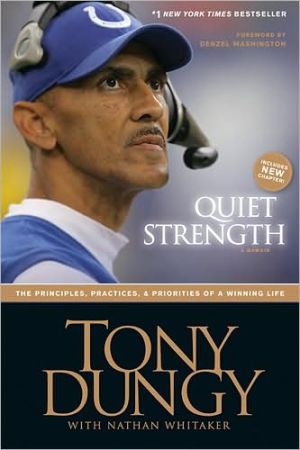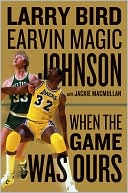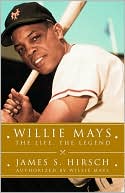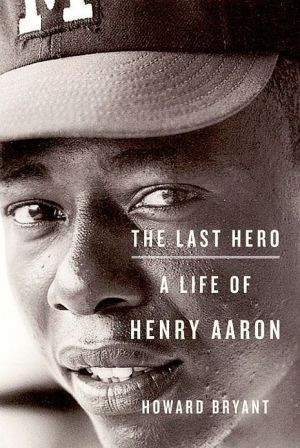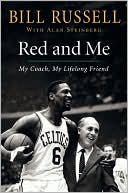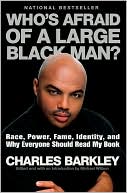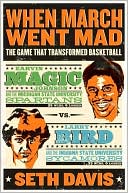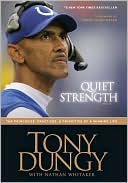I May Be Wrong but I Doubt It: Some Things I've Learned So Far
Charles Barkley has never been shy about expressing his opinions. Michael Jordan once said that we all want to say the things that Barkley says, but we don’t dare. But even die-hard followers of the all-time NBA great, the star of TNT’s Inside the NBA and CNN’s TalkBack Live, will be astonished by just how candid and provocative he is in this book—and just how big his ambitions are. Though he addresses weighty issues with a light touch and prefers to stir people to think by making them laugh,...
Search in google:
Charles Barkley has never been shy about ex-pressing his opinions. Michael Jordan once said that we all want to say the things that Barkley says, but we don’t dare.Publishers WeeklyNBA star Barkley-still only the second basketball player in history, along with Wilt Chamberlain, to total more than 23,000 points, 12,000 rebounds and 4,000 assists-has refused to go quietly into the mists of sports legends. One of the most controversial professional athletes in any sport, Barkley has repositioned himself as an outspoken and provocative sports commentator for the TNT network, reaping a new and large viewing audience in the process. This sports memoir-Barkley's first-is a highly entertaining and remarkably thoughtful work that successfully continues his ongoing repositioning from on-court wild man to provocative analyst. "I'm trying to transition from sports into something broader, with wider social implications," he writes. In a book that often reads like an overlong Sports Illustrated interview, Barkley explores a wide range of interests. Each chapter has a theme, and Barkley has no problem speaking his mind on any topic, whether it is politics ("Poor white people and poor black people just don't know how much they have in common. Rich people don't give a damn about either group") or lack of minority control in sports ("Black people ought to want other black people to be successful and work hard and accumulate some wealth and build a new damn reality"). In between these chapters are other sections that retell some of the great and not-so-great moments in his career, such as his involvement with Michael Jordan in the U.S. Olympic medal-winning "Dream Team." But transitions within and between chapters can often be jarring (in one chapter he suddenly launches into a criticism of abusive priests). Despite that, this is a very entertaining look at one of the most intelligent minds in pro sports, and like Barkley's career, it's bound to produce fierce arguments. Copyright 2002 Cahners Business Information.
What's Really on My Mind\ I May Be Wrong but I Doubt It isn't a basketball book. It's not really even a sports book, although basketball and sports are the vehicles I'm using to generate a much broader discussion, and are the things I am most intimately familiar with. There's been increased criticism of athletes, sometimes by people in the news media and sometimes by activists, that we run away from dealing with serious social issues, like poverty, racism, politics and education.\ Not only am I not running away from these discussions, at this point of my life-approaching forty years old and two years into retirement after a sixteen-year career in the NBA-I usually prefer them. I'm tired of talking about stuff that doesn't matter. I'm tired of "Charles, tell me which coaches you hated during your career," or "Charles, let's talk about which players in the league you don't like," or "Let's talk about groupies."\ Most reporters, I can't even convince them to talk about any serious topics, which I'm happy to have the chance to do now. If the topic is groupies, guys will blow my phone up. That's easy. If I want to say something bad about anybody, reporters will hang on every word. That's easy. So don't turn the page thinking you're going to read about that, because that's not what this is. I've done enough of that for the last twenty years. What I've come to realize is that I can have some control over this process. I can talk about whatever the hell I want to talk about.\ At this point in my life I'm trying to transition from sports into something broader, with wider social implications. I don't know if you can do it when you're playing. Guys get criticized for not being more socially conscious, for not spending more time talking about social issues, and that criticism may sound legitimate. But if you actually take on some social issues, particularly if you take some unpopular positions, you're going to get hammered.\ People say all the time they want you to talk about social issues. But if you do, and if you take a position that doesn't go down easy, you're "militant." My favorite one is, "When is the last time Charles Barkley struggled? What does Barkley know about growing up poor?" Well, I do know. Damn, I was poor. I grew up in the projects in Leeds, Alabama.\ If I was still poor, I wouldn't have the platform to speak up about the stuff we ought to be confront-ing. Some years ago, in a Nike commercial most people consider controversial, I suggested that athletes should not be primary role models. I told people to listen to their parents, not to athletes or celebrities, and I got killed for it. Is that bad advice, to say, "Listen to your parents, or your teachers, and not some damn celebrities"?\ But that's okay. I'm not overly concerned about people disagreeing with me. I'm concerned with the response in that I want to get people talking, get the discussion started. I'm going to say what's on my mind. Dan Patrick of ESPN, who I like very much, introduced me once as "Charles Barkley, who makes you think, makes you mad, but sometimes doesn't think before he talks." And I said, "Hey, wait a minute. I know exactly what I'm saying. I may say something some people consider controversial or outrageous, but I've thought about it before I said it." I always know what I'm saying, and I'm always prepared for the reaction.\ I may ask a dozen people about something, especially when it's a sensitive topic or something that's likely to be explosive. And I like getting input from smart people and people who've experienced things I'll never experience or haven't yet experienced. But ultimately I'm going to make up my mind and say what I really feel. Saying something just for the hell of it isn't worth anything because unless you provoke some conversation, what you're saying is irrelevant. Just because I say something and get a strong reaction or a negative reaction from somebody doesn't mean I didn't anticipate it. I don't like getting caught off guard. Hell, a lot of times I know exactly what's coming and I say it anyway because I feel it needs to be said, or I need to be confrontational on a certain issue. But I've thought about it, trust me.\ And I also know people think, "Charles is just saying that to get attention." And, yes, there are times I'll say something crazy or silly because I'm not going to be serious all the damn time. And other times the way to make an important point is by using humor. But when you read my comments in interviews it's not like I was seeking attention. Somebody asked me to sit and talk about something. I didn't go to some publication or network and say, "Hey, I've got some shit to say." They called and asked me to talk about a number of issues. I've started telling people, "Don't ask me if you don't want to hear what's really on my mind, or what I feel is the truth about a subject." Is it okay to express myself only as long as I say what somebody hopes I'll say? Do you think I'm going to say something I don't feel, or just tell people something they want to hear?\ In March of 2002 I did a piece for Sports Illustrated with the magazine's longtime basketball writer Jack McCallum, and immediately after it ran I must have had two hundred people come up to me and start to tell me their opinions, what they liked and didn't like. Some people who said they didn't even subscribe to Sports Illustrated said they picked up the issue and read the piece. Most of the media reaction to it had to do with my opinions about Augusta National changing the course, and why I thought they were targeting Tiger Woods. A lot of people come up and say they disagreed with what I said about Augusta National, but I haven't had anybody say to me they disliked the things I discussed in the piece. I would say to almost all of them, "Okay, you disagree with my view on Tiger and Augusta, that's cool. But what did you think of the entire article?" See, it wasn't as important for them to agree with me as to get whoever read it engaged in some sort of discussion or debate about the bigger picture.\ I've been criticized for expressing certain views for nearly twenty years. And even though I never minded getting hammered, toward the end of my career I was thinking, "Let me finish my playing career before I start seriously discussing all the social issues of the day. I'll still be in the public spotlight because I'm probably going to be in TV to some extent. Then I'll be better able to handle it." The more serious the subject matter, the more time you need to spend thinking about it and the harder people come at you if they disagree. As I said, I don't have any problem with people who disagree with me because the real reason you take on serious issues is to get some dialogue started on difficult and sensitive topics. But disagreement and ridicule are not the same thing.\ Another reason I'm looking at a transition is I don't know that you can give full attention to subjects as serious and as sensitive as race and the economy and education, then just shift into doing all sports. I don't know if the two go together. I've always contended that sports don't help black people. . . . We don't own any of the franchises, don't run any leagues, barely run any teams. You talk to these kids and all they want to talk about is sports, and I guess they don't realize how little other than playing sports black people have to do with the industry. But they all want to play sports. Playing sports is fine, but too often it's all they want to do.
\ From Barnes & NobleHe scored more than 23,000 NBA points, won two Olympic medals, and was an 11-time NBA All-Star; but for most of us, Charles Barkley's most notable attribute is his mouth. As a player and as a TNT sports commentator, "Sir Charles" has won our attention with his brash and witty remarks about everything from NBA referees to race relations and role models. This aptly titled memoir spotlights the strong opinions of the man Time called "the most entertaining talking head in sports broadcast…a mix of Yogi Berra neologisms and Winston Churchill."\ \ \ \ \ Publishers WeeklyNBA star Barkley-still only the second basketball player in history, along with Wilt Chamberlain, to total more than 23,000 points, 12,000 rebounds and 4,000 assists-has refused to go quietly into the mists of sports legends. One of the most controversial professional athletes in any sport, Barkley has repositioned himself as an outspoken and provocative sports commentator for the TNT network, reaping a new and large viewing audience in the process. This sports memoir-Barkley's first-is a highly entertaining and remarkably thoughtful work that successfully continues his ongoing repositioning from on-court wild man to provocative analyst. "I'm trying to transition from sports into something broader, with wider social implications," he writes. In a book that often reads like an overlong Sports Illustrated interview, Barkley explores a wide range of interests. Each chapter has a theme, and Barkley has no problem speaking his mind on any topic, whether it is politics ("Poor white people and poor black people just don't know how much they have in common. Rich people don't give a damn about either group") or lack of minority control in sports ("Black people ought to want other black people to be successful and work hard and accumulate some wealth and build a new damn reality"). In between these chapters are other sections that retell some of the great and not-so-great moments in his career, such as his involvement with Michael Jordan in the U.S. Olympic medal-winning "Dream Team." But transitions within and between chapters can often be jarring (in one chapter he suddenly launches into a criticism of abusive priests). Despite that, this is a very entertaining look at one of the most intelligent minds in pro sports, and like Barkley's career, it's bound to produce fierce arguments. Copyright 2002 Cahners Business Information.\ \ \ KLIATTCharles Barkley is an outspoken basketball player whose commentary here focuses on social issues off the basketball court. He writes about racism, prejudice, equal opportunity, white supremacy in the New South, and his view of "keeping it real" as a wealthy, successful professional basketball legend. He describes how his ability to "get to the point" is often viewed negatively by the public and the press but is essential to the process of promoting social change. Barkley chooses his battles, and when he does, the topics often center on the African American's role in a formerly white-dominated society that is becoming more diverse and international. Barkley does an artful job of discussing his interpretation and influence on apartheid, while at the same time talking about the details of the NBA that make him a quasi-expert on the current and future state of professional basketball. Some obscenities are scattered throughout the book but do not detract from its readability or a positive recommendation for purchase. KLIATT Codes: SA—Recommended for senior high school students, advanced students, and adults. 2003, Random House, 259p., Ages 15 to adult. \ —Tom Adamich\ \ \ \ \ Library JournalThe former NBA star, now a studio analyst for TNT's Inside the NBA, speaks candidly on some of the burning issues of the day: race, politics, 9/11, and pedophilia among Catholic priests. He also focuses on his family, basketball, and being rich. (LJ 10/15/02) Copyright 2002 Cahners Business Information.\ \ \ \ \ Kirkus ReviewsUncontroversial, positive opinions from former NBA standout Barkley. Barkley hardly deserves his reputation for being a loose cannon. His more notorious utterances were routinely taken out of context; if he did make a serious personal mistake, as when he spit at a heckler and the gob hit a young girl, he made good his apology and learned from the error. More to the point, his reputation for being a rebarbative figure hinges on his urge to address serious issues-the prevalence of racism, the need for education, the emptiness of taking celebrities as role models-in a forthright fashion. Yet he also appreciates the reality of "star power" and the responsibility it entails: not just to play the best he can for team and fans, but to put big social issues on the table and keep people talking about them. This may mean calling Augusta National on its discriminatory policies-though he is curiously silent on its treatment of women, something that obviously deserves at least a mention-while at the same time noting that "Tiger winning at Augusta allows a whole lot of people an easy way to feel better about ugly shit like exclusion." Much is made of Barkley's Republicanism, and he does evince a strong fondness for money, but he comes across here as more of a Vermonter: thrifty, plain-speaking, hardworking, with a sense of responsibility and a love of his craft. Is a true baddie really about to say, "There's no way God allowed me to make all this money, meet all the people I've met, and rise to this status just to sit around, count my money, and not to try to help people improve their lives"? Barkley may reject being a role model-that's what family and friends are for, he says. But as someone whodemands that kids think and assume responsibility, he's headed in the right direction.\ \

